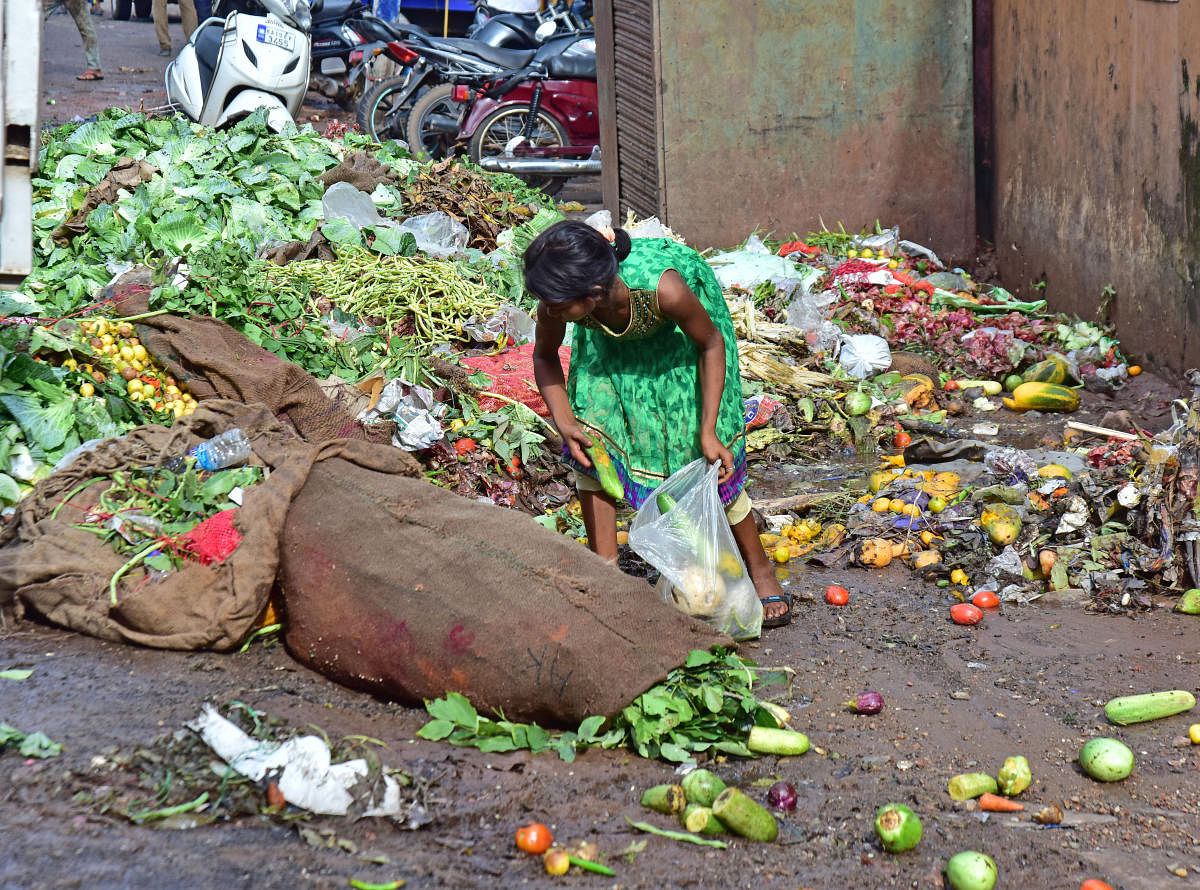
Lakshmi (name changed), 53, a housemaid in Bengaluru, lost her job due to old age. Her husband, Raju, a former driver, is disabled. She has two sons, one who is married and employed as an office boy and a 16-year-old who goes to a government school near Koramangala.
“Without the help of the food truck, we would have had nothing to eat,” she said, adding that she has had nothing to eat since the previous night. The food truck gave her four portions of rice, plus curry and four chapatis. “This is enough to last us until tomorrow morning,” she said.
It is clear that the lives of these people revolve around the constant struggle to find food. The paradox, though, is each day, tonnes of food waste is making its way to trash bins when an overwhelming number of people like Lakshmi are going to bed wondering where their next meal is coming from.
A study by the University of Agricultural Sciences, Bengaluru, indicates that about 20% of prepared food is wasted in the country, especially in functions in urban areas.
Professor M G Chandrakanth, director, Institute for Social and Economic Change, Bengaluru, said, “The food wastage is modest at farm level, but apparent at the prepared food level. Around 1,00,000 weddings and social events are held in the country every day. The food wastage is up to 30% in weddings. It is possible to reduce the number of items on the menu, but this needs awareness especially among the elitist.”
Food wastage or loss also occurs due to lack of processing facilities, he told DH. “With processing [at the primary level], about 10% of the food wastage can be reduced. Fruits such as pomegranate, pineapple and jackfruit need modest primary processing. These do not need secondary or tertiary processing which involves chemicalisation, addition of sugars, salts and so on,” he said.
“However, food wastage is relatively modest in rural areas. Urbanites relatively do not care as much with respect to food wastage at functions,” said Chandrakanth.
Clearly, there seems to be no method in the madness when it comes to food wastage at celebrations. Food is made excess in the fear of falling short but ultimately it goes to waste.
In large quantities
“In Bengaluru, 50% of food waste comes from marriages. Every Sunday, for events including marriages, food is prepared for around 50 lakh people but only around 30 lakh attend these events. Food for around 20 lakh people goes to the bin. This can actually feed the entire Bengaluru for a week,’’ said R B Shivakumar, who collects surplus fresh food from different venues like weddings, and distributes it to the needy.
When India ranks 103 among 119 countries on the Global Hunger Index 2018, these food wastage figures are simply hard to swallow.
“An average person needs about 400 gm of food per meal. However, the amount of food served at functions is one to two kg per plate,’’ rued Shivakumar.
Shyamala Suresh, a member of the Solid Waste Management Roundtable, who is working to create a model of zero-waste weddings, explained that the trend of extravagant weddings is creating a massive surplus of cooked food which is often trashed.
Because of the work of several NGOs, some wedding organisers are now realising that this excess food can be donated to orphanages in the area.
A caterer supplying to a cricket club in Bengaluru, however, specified that supplying to orphanages comes with its own set of challenges and that not all orphanages accept all food.
“Careful planning is required before supplying food to orphanages. For example, caterers must inform that food will be served to them at least 24 hours in advance, to ensure that the orphanage kitchen doesn’t cook food. In addition, many orphanages don’t accept sweets, because of concerns that children will become addicted to them,’ she said.
Marwan Aboobaker of Hasiru Dala, an NGO, which works with waste-pickers and channelises food wastage from various events, said that on an average, at a sit-down meal, about 10 to 20% of food is wasted but it’s at buffet dining that there is maximum wastage.
Working in a void
According to Aboobaker, the challenges of ensuring that excess cooked food is not trashed outright is a major challenge that is being addressed by only a small army of volunteers and non-governmental organisations, working in a void with almost no legislation governing how excess food must be tackled.
“Currently, there is no legislation to combat food wastage,” said Chandrakanth. “However, the Ministry of Consumer Affairs, Food and Public Distribution have recently decided to regulate the amount of food to be served by restaurants and hotels to their customers in order to prevent possible wastage,” he said.
“The ministry has also initiated a consultation with farm scientist M S Swaminathan and several civil societies to suggest ways to reduce the wastage of food items at big events,” he added.
Dhiren Kanwar, managing director of the Bangalore Food Bank which cooks meals for the needy and procures packaged food for distribution to NGOs working with indigent populations in and around the city, said that a policy implemented by the Ministry of Food Processing Industries intended to improve how packaged food is processed has helped curb food waste.
“In this way, we have at least one government policy that is helping to address the problem, but much more needs to be done,” added Kanwar.
To illustrate the scale of the problem, Aboobaker said that over the last 12 months, Hasiru Dala worked with 120 events. “Only 10% of these events passed on cooked food to the needy. The remaining 90% recycled excess food,” Aboobaker said, pointing out that it is important to note that the excess food is food that was cooked but never served.
Another problem, according to him is that NGOs working to channelise food to the needy have only a three-hour window to deliver cooked food to those who need it. “In some events, food would have been pre-prepared off-site hours before, which means that it would be largely stale by the time it reaches those in need,” he said.
According to 2013 figures by the Ministry of Statistics and Programme Implementation, Rs 44,000 crore worth of food goes to waste each year due to lack of adequate storage; included in this figure is Rs 13,300 crore worth of fruits and vegetables which goes to waste.
Because of inadequate storage, upscale supermarkets in Bengaluru donate all food items which are bound to expire such as vegetables and fruits to charities and NGOs.
A senior member of a food collection NGO who did not want to be named said that these items are donated just before a day of them going stale or rotten, and so they are usually suitable for consumption within a 24-hour period.
“To cut down food wastage, focus should be on wastage at celebrations, rather than restaurants or households, where people are careful about what they buy or order,” Aboobaker said.
Lack of awareness
“Some people are aware that these celebrations should be environment-friendly and do cut down wastage, but these are only a small number. Most people have the mindset that no guest should be left wanting more. Also, there is a lack of awareness about those who are distributing excess food to the needy,” he said.
All said and done, the fight against food wastage begins by creating awareness among the consumers. “Food wastage at the prepared food level, which is a prominent ethical issue, can be addressed only by creating awareness among the elitist who are wasting food,” said Chandrakanth.
“Creating awareness among consumers reduces food wastage which results in equity and increases social responsibility and concern,’’ he said.
Moreover, he felt it is crucial to impose tax on excessive consumption and extravagance in expenditure at social functions, be it weddings, hotels or restaurants.
According to Sumathi and Anudha, two waste-pickers residing in a lower-income area in the Banashankari locality of Bengaluru, one solution for wedding halls, located at the periphery of slum areas, is to donate food outright to neighbourhoods in the area where the possible number of recipients is high.
Official statistics show that out of Bengaluru’s official population of 10 million, 16% lives in the city’s 597 slums, and nearly 50% of the city’s population lives in single rooms. According to the two women, one such wedding hall in their locality did exactly this for five to six years, until it inexplicably stopped a decade ago.
“This free food, when it was being given, gave families the luxury of at least one full meal which did not require spending from our limited financial resources,” said Sumathi who is in her mid-30s. Both women, who clear excess food at events, said that the sight of so much food being wasted while so many people went hungry in the city, makes them despondent.
While Aboobaker explained that there is a general ignorance on the part of event organisers that an avenue exists to channelise food to the poor, both women, however, made it clear that they could never request organisers to donate food. When asked why, both women flushed and would not answer.
“It is because of social class differences,” explained Aboobaker. “They could never think of requesting something from a person of a high socio-economic standing. So the food is instead sent for recycling.”
